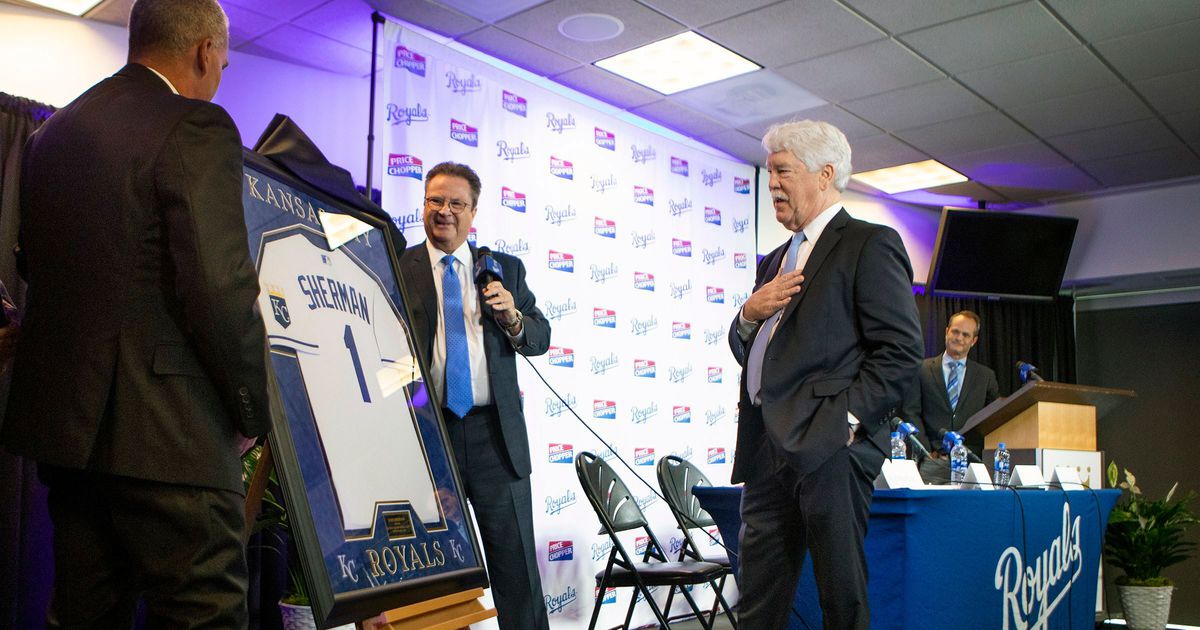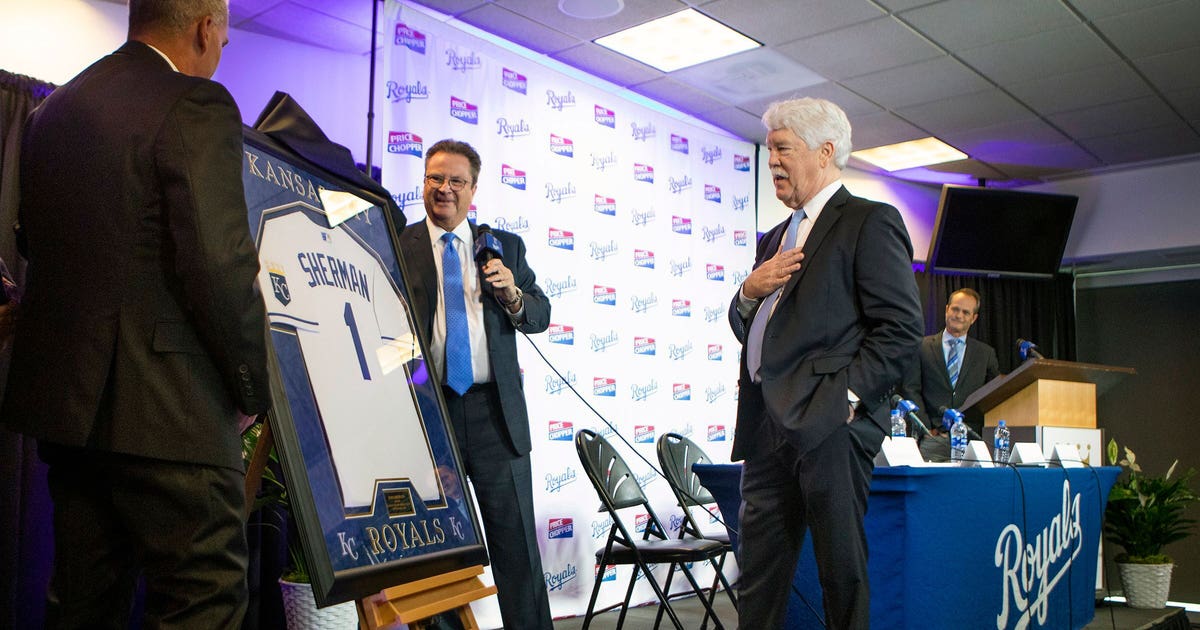Royals fans get a glimpse of new owner Sherman in news conference


KANSAS CITY, Mo. — John Sherman had sold his successful energy company and embarked on a nine-month trip around the world with his wife, Marny. They had visited Africa and Asia and all points between, and had landed in Europe when the most incredible of things happened.
Sherman’s long-suffering but beloved Kansas City Royals reached the World Series.
It was Marny who, upon noticing her husband watching for updates on his phone, encouraged Sherman to return to Kansas City. So smack-dab in the midst of their global sojourn, the white-haired businessman with a bushy mustache and self-deprecating sense of humor hopped a jet home in time to watch Games 6 and 7 between the Royals and San Francisco Giants at Kauffman Stadium.
Sherman says he didn’t expect the #Royals to reach the 2014 World Series and so he was on a trip to Europe with his family — but he came home, leaving the family behind, to attend Games 6 and 7. #AlwaysRoyal pic.twitter.com/wkK2B570Yo
— FOX Sports Kansas City (@FSKansasCity) November 26, 2019
Little did Sherman know, five years later he would be back in the ballpark, staring out a window from the club’s Hall of Fame on Tuesday after being introduced as the team’s new controlling owner.
“The opportunity to do this in your hometown is very, very special,” said Sherman, who grew up an Army brat but ultimately settled in Kansas City, where he founded both of his energy businesses.
“I feel incredibly fortunate to be sitting in this seat,” Sherman said, “but I also realize the privilege and responsibility that we have in this seat on behalf of our fans, our players and coaches, our associates and our community.”
The purchase of the Royals from David Glass for approximately $1 billion was approved unanimously by owners of the other big league clubs at their meeting last Thursday. The transfer closed Monday, and the full list of owners — primarily local businessmen along with a few famous fans, such as actor Eric Stonestreet — was released prior to Sherman’s introductory news conference Tuesday.
His group is just the third owner of the Royals since their inception in 1969, when Ewing Kauffman established the team. The Glass family served as caretakers of the franchise following Kauffman’s death before purchasing it outright and retaining control until earlier this year.
Sherman had approached Glass about buying the team about five years ago, around the time he was traipsing around the world, but the timing wasn’t right. So he ultimately bought a minority interest in the division rival Cleveland Indians, giving him experience in running a ballclub.
That ownership interest has been placed in a blind trust and eventually will be divested.
Sherman hadn’t given much thought to buying the Royals the past four seasons, so he didn’t even answer his phone when it rang during spring training. He was focused on the Indians’ upcoming season, their split-squad game that afternoon and, well, the phone number …
“I looked down and it was a call from Fayetteville, Arkansas,” Sherman recalled, “and at my age I’m a big target for all these scammer-robo calls, and they tend to all come from Arkansas for some reason. At best, they’re going to be trying to sell me a Medicare supplement, so I ignored the call.
“Then later in the day we were on our way to the stadium,” he continued, “and I had a voice mail and it was David Glass. Very casual, ‘John, if you get a chance, give me a call at your convenience.’ I didn’t think much of it. I called David and he said, ‘John, I wanted to give you a heads-up. The family has decided to sell the team. I don’t know if the timing is right, but you would be my first choice.’”
Sherman offers some background on how he came to be #Royals owner, starting with a phone call from David Glass about six months ago. pic.twitter.com/SUQHp678rJ
— FOX Sports Kansas City (@FSKansasCity) November 26, 2019
Rather than return to the Indians’ ownership suite, Sherman walked around the stadium concourse and mulled the offer, something that he continued to do for the next several days. He ultimately called Glass back and they began the long and complex transaction.
The negotiations were kept under tight wraps, and it wasn’t until all the major points had been hammered out that word leaked of the sale in late August. The Royals quickly acknowledged it, but any purchase must be approved by the other owners at their annual meeting in November.
Given his experience with the Indians, and Sherman’s roots in Kansas City, it was a formality.
Sherman takes over at a unique juncture for the organization.
After losing to the Giants in the 2014 World Series and beating the New York Mets to win the 2015 title, the club quickly went downhill. Many of the Royals’ best players hit free agency, draft misses had left their prospect pool barren, and the result has been back-to-back 100-loss seasons.
But there were signs late last year that another wave of talent could arrive soon, including a group of heralded young pitchers still in the minors. There is a fresh feeling after the retirement of manager Ned Yost and the hiring of Mike Matheny, who had been serving as an adviser. And the Royals are finalizing a lucrative new TV rights deal that should help their financial flexibility.
Sherman described his management style as relatively hands-off, meaning Matheny and general manager Dayton Moore will be primarily responsible for the on-field product. But he’s also a longtime baseball fan, and that means Sherman plans to spend plenty of time in the ownership box.
“I’ve got a lot to learn here, and these guys are pretty optimistic,” he said. “I heard Mike say, ‘I’m not going to call it a rebuild,’ and I think that’s probably right in some ways.
“Our objectives are to compete for a championship on behalf of our fans. I’ve heard Mike say it and I heard Dayton say it, we want to try to do it on a sustainable basis, and have sustained success.”








